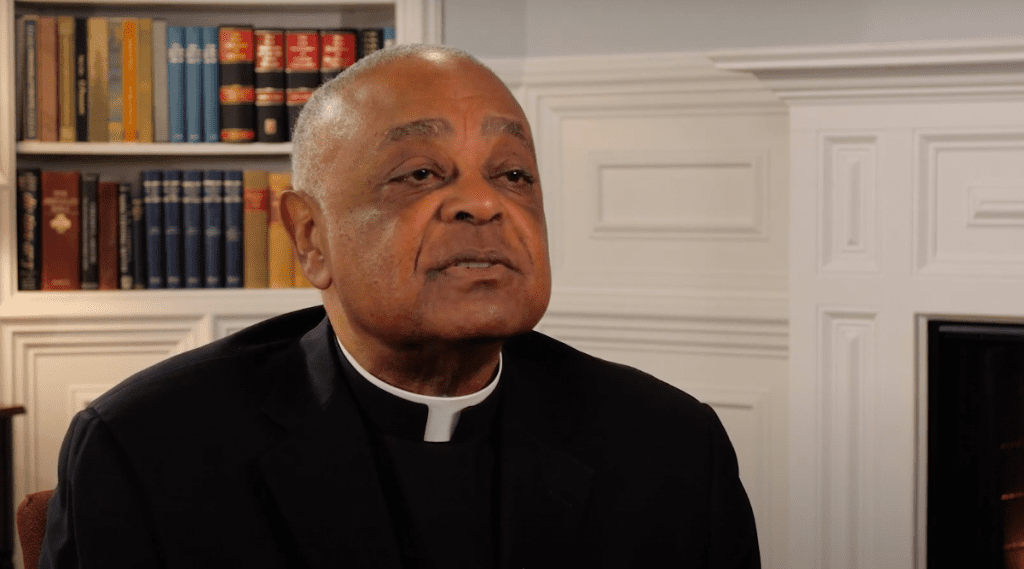Pro-Abortion Biden Kosher With DC Archbishop

Wilton Gregory, the Catholic Archbishop of Washington, will be made a cardinal this weekend. He has said that there will be no problem with the incoming Catholic president, Joe Biden, receiving communion, despite the fact that he is a pro-abortion fanatic. Excerpt:
Archbishop Wilton Gregory’s comment is sure to raise questions about the Church’s pro-life witness. But for some Catholics, the remark might also raise questions about the sincerity of U.S. bishops on the topic of ecclesial reform.
In 2004, Cardinal Joseph Ratzinger, then head of the Church’s doctrinal office, told U.S. bishops in a memo that a Catholic politician “consistently campaigning and voting for permissive abortion and euthanasia laws” is engaged in “manifest,” and “formal cooperation” in grave sin.
In such a case, the politician’s “pastor should meet with him, instructing him about the Church’s teaching, informing him that he is not to present himself for Holy Communion until he brings to an end the objective situation of sin, and warning him that he will otherwise be denied the Eucharist,” Ratzinger wrote.
If the Catholic perseveres in grave sin and still presents himself for Holy Communion, “the minister of Holy Communion must refuse to distribute it.”
Ratzinger’s memo was an application of canon 915 of the Code of Canon Law, which says that Catholics “obstinately persevering in manifest grave sin are not to be admitted to holy communion.”
In short, Ratzinger’s memo gave bishops instruction on how to apply the Church’s law. On Tuesday, Archbishop Gregory said he has no plans to do so.
A reader of this blog who is a Catholic parish priest e-mailed me in response to this news, to say that he believes the Catholic bishops — including the Pope, by his episcopal appointments — continue to trash their moral authority. The priest said that the bishops are demoralizing the most faithful of their flock. He said that Catholics ought to restrict their tithing to ministries restricted to their own parish, and make the bishops feel the financial pinch. That’s the only thing they understand, he figures.
In my diocese at least (and I’d have to imagine others), the diocese has the ability to tax parish donations. Restricting the donation doesn’t necessarily get around this. In addition, with annual campaigns such as DSA or CSA (Diocesan or Catholic Services Appeal), parishes are assigned a target, and if they don’t meet their target, the difference can be taken from their general fund. The diocese doesn’t necessarily do this, but it has the power to do so. You may already know this; I doubt most Catholics do. (It’s worth emphasizing that this is what I’ve gleaned from many years working in a parish, but I have no direct experience with exactly how it works–I’m doubtless ignorant of important details.)In the last year I came across a potentially powerful idea via The Personalist Project, which is parish-wide lay associations. Again, in my years of working in a parish, I have seen just how little influence the average parishioner has in the operation of their own parish. You have a few lay staff, a few members on parish councils and commissions, a few wealthy donors, and a few others who have influence for one reason or another. So what do you do if you want to voice your opinion? You write an email to the pastor, who received 300 other emails that week and barely has time to read all his email, much less give careful thought to each one. (Or, as illustrated by COVID, received 300 wildly different opinions on exactly how the parish should or should not respond.) The voice of the average parishioner simply gets lost–there is too much noise.But what if the pastor were to receive communication from his parish regarding COVID or some other issue, in the form of a collective statement? What if the pastor could ask the Lay Association of St. Somewhere for their collective opinion on changing weekend Mass times? What if donations were placed in escrow, and passed on to the parish (or diocese) after the Lay Association of St. Somewhere had voted to approve? Lay associations are canonical entities and have to follow certain rules, get their bylaws approved by the bishop, etc., so we are not talking about completely independent organizations here. Nor are we talking about democratizing doctrine or other things that really are the proper domain of the bishop/priest. Rather, we are talking about giving the “co-responsibility of the laity for the Church” real, effective teeth. Would it be messy and less efficient? Sure. But so is marriage at times, and I can confidently say that my family is all the better for my wife and I having to regularly work to find a consensus. Besides which, who would claim that the current way of doing things is working well?